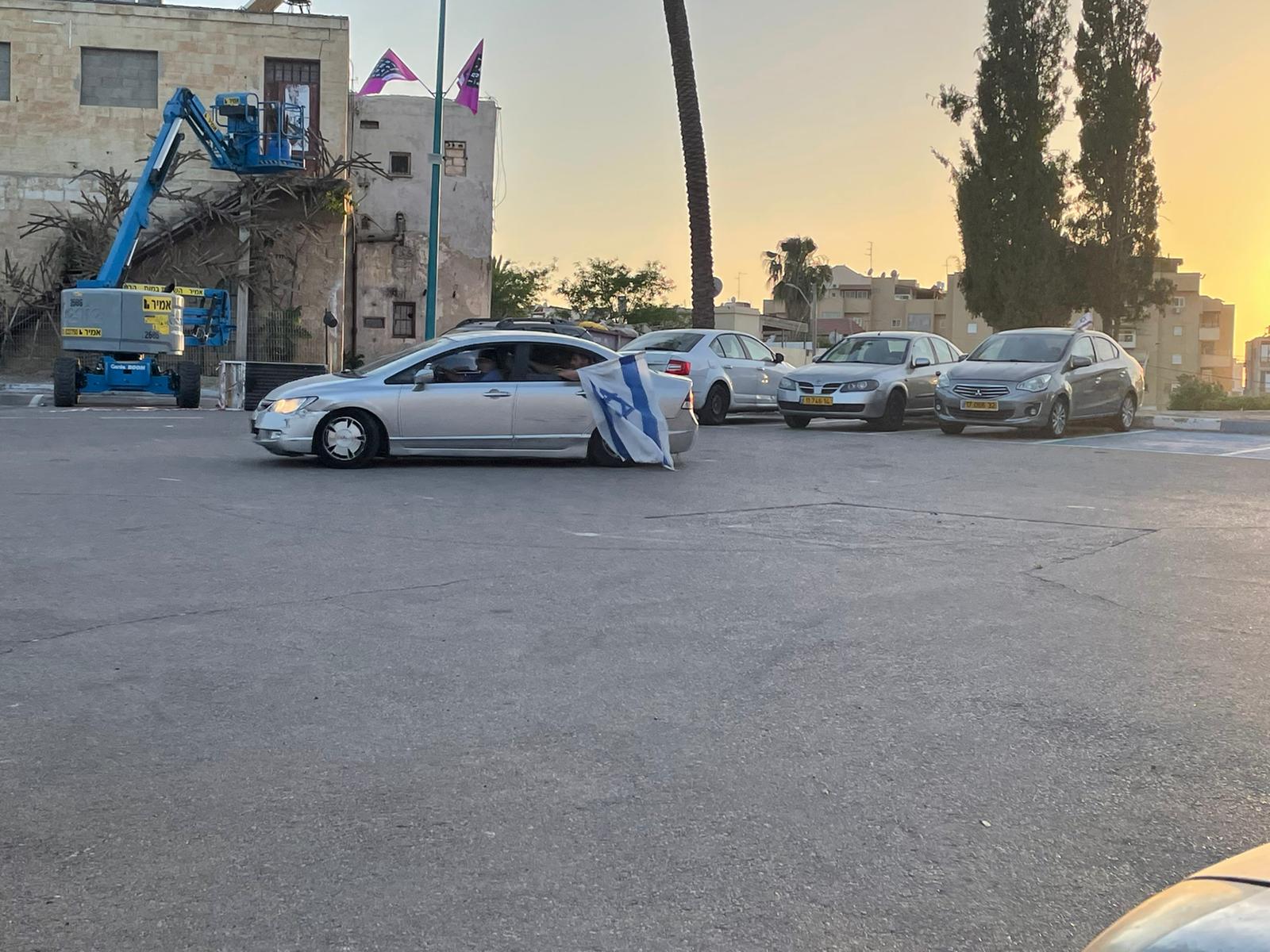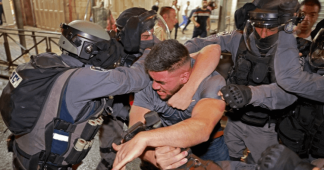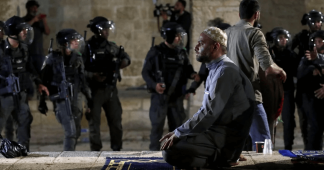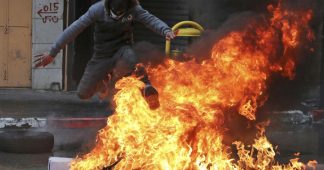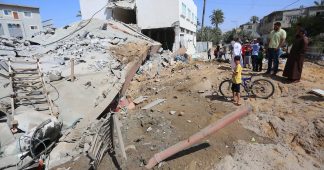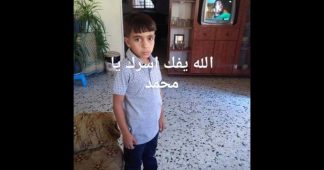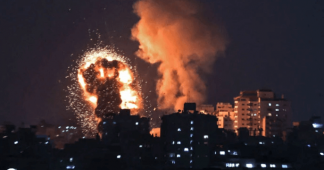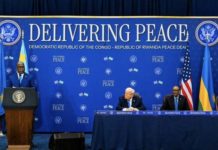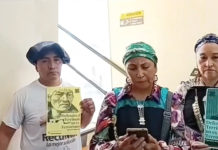The Palestinian-minority city, a symbol for many Palestinians, has been on edge after days of protest, fires, and the murder of a Palestinian protester
Lubna Masarwa, Frank Andrews
12 May 2021
Israeli ultra-nationalists, some with weapons, roamed the streets of Lod on Wednesday, as mobs attacked a mosque in the city ahead of a newly announced night curfew.
The Palestinian-minority city, just south of Tel Aviv, has been on edge after days of protest, fires, and the murder of a Palestinian protester.
Lod, known as Lydd by Palestinians, has not caught much international attention during the rapid escalation of the past week, with rocket fire being exchanged between Israel and Gaza and heavy-handed crackdowns on worshippers and demonstrators in and around Jerusalem.
But confrontations in the town erupted on Tuesday night between Palestinian residents of Israel and Jewish-Israelis, with cars and buildings burned, and at least one synagogue torched. The night before, a Palestinian man had been shot dead.
Prime Minister Benjamin Netanyahu visited the city after the mayor said it was in a state of “civil war”.
Israeli authorities also imposed an overnight curfew in the city following an earlier declaration of a state of emergency and scores of arrests in response to Palestinian protests.
MEE’s correspondent in Lod described an atmosphere of rising anxiety and tension.
Israeli ultra-nationalists attacked the Great Omari Mosque of Lod on Wednesday evening, while appeals broadcast on the mosque’s loudspeaker called on locals to protect the religious building.
Videos from the city showed confrontations near the mosque, as inside people shouted and ran frantically.
#عاجل مستوطنون يطلقون النار على المسجد الكبير بمدينة اللد المحتلة. pic.twitter.com/t2mzGzXBEG
— وكالة شهاب للأنباء (@ShehabAgency) May 12, 2021
Earlier, MEE’s correspondent in the city heard shooting and saw residents of Israeli settlements in the occupied West Bank marching with Israeli flags – with some wearing t-shirts displaying army unit names – as young Palestinians gathered outside the mosque. The Palestinians said they suspected Israeli gangs were planning to attack the mosque.
One, a 21-year-old called Noam, told MEE that he had come to “settle in the houses of the people who left because they were scared of the Arabs”, adding “we gathered to walk around the city and show it’s Jewish”.
“I think the situation will change if we strongly deter them,” he said, referring to the Palestinians. “When they get crazy like animals, to shoot one in the chest or in the head, just once is enough and it will be over. Someone who’s throwing stones, and is trying to kill a Jew, he deserves a bullet in the head, and then things will calm down. Death is what deters.”
"If they act like animals, shoot one in the head"
A young Israeli settler says death is the only thing that will deter Palestinians from protesting, after he and his friends drove to #Lod to protect Jewish houses following heated protests#Israel #Palestine pic.twitter.com/UJEcd66BBw
— Middle East Eye (@MiddleEastEye) May 12, 2021
Elsewhere, our correspondent witnessed a heated argument between a Palestinian woman and an Israeli, and saw numerous burnt-out cars from the previous night.
Curfew
MEE’s correspondent was told that another night of violence was likely, despite the fact that Israeli police spokesman Micky Rosenfeld told MEE on Wednesday that “a strategic decision” had been made to enact a curfew between 8pm and 4am, local time (1700-0100 GMT).
“People are not allowed to be in public places, people are not allowed to leave the house, people are not allowed to enter the city,” he said.
Hundreds of border police officers – 16 reserve units usually deployed in the occupied West Bank – have been mobilised in the area, Rosenfeld said.
It is the first time since 1966 that Israeli authorities have used emergency powers over a Palestinian community.
“Police call upon the public to be aware of the threat of the rocket attacks and to listen to all orders given when going into safe zones and safe areas,” Rosenfeld continued, referring to Hamas rockets being launched from Gaza, part of ongoing rocket exchanges between Hamas and Israel that have killed 65 Palestinians, including 16 children.
Israeli authorities have so far confirmed five deaths as a result of the missiles fired from Gaza on several Israeli cities, including Tel Aviv. Two of the deaths, a father and his teenage daughter, were Palestinian residents of Lod, according to the city’s mayor.
A timeline of recent events
Protests broke out in Lod on Monday, as they did across Israel and the occupied Palestinian territories, against Israeli security forces’ repeated storming of al-Aqsa Mosque and their attacks on worshippers and protesters in the Sheikh Jarrah neighbourhood and Bab al-Amud Square.
A Palestinian man was then shot dead in the city, late on Monday evening.
In footage widely shared online, the man was seen laying on the ground with many people crowded around him calling for medical attention.
The Palestinian news website Arab48 cited local sources as saying the protester, named as Moussa Hassona, was shot dead by an Israeli ultra-nationalist, while the Israeli newspaper Haaretz blamed it on “armed Jewish residents defending against rioters”. Israeli police confirmed the fatality without further explanation.
Arab48 cited a member of the Popular Committee in Lod, Tayseer Shaban, as saying Israeli nationalists fired indiscriminately on crowds of Palestinian demonstrators. He said the protesters “erupted peacefully in support of Al-Aqsa, and were surprised by the bullets of the occupation and its settlers”.
Israel’s Public Security Minister Amir Ohana wrote later that whomever shot Hassona should not have been arrested, and called for their release: “The arrest of the shooter and his friends in Lod, who apparently acted in self-defense, is a terrible thing. Even if there are details the public isn’t aware of yet, law-abiding citizens bearing arms increases the authorities’ ability to prevent any threat or danger. Arrests and releases aren’t for the minister to decide. If it were, they’d be released. The law enforcement system would do well to do that.”
Yamina party leader Naftali Bennett also called on authorities to release the suspects, according to Haaretz.
“The fact that, at the moment, they’re under arrest is morally unjust and sends a bad message to anybody trying to defend themselves,” he tweeted on Wednesday morning. “The Public Security Ministry and police must immediately assure the families besieged in their homes, for fear of the Arab rioters who should be brought to justice.”
After Hassona’s funeral on Tuesday, confrontations erupted again between Palestinian residents and Jewish-Israelis. Haaretz reported that, as well as cars and a synagogue being set on fire, a 56-year-old Jewish man was gravely injured.
Prime Minister Benjamin Netanyahu visited the city overnight, calling the events “anarchy”.
Police sent reinforcements to the city on Wednesday morning, according to Haaretz.
Prime Minister Benjamin Netanyahu spoke this evening with Defense Minister Benny Gantz; the two agreed to immediately transfer Border Police battalions from Judea and Samaria to Lod.
— PM of Israel (@IsraeliPM) May 11, 2021
National Police Commissioner Kobi Shabtai said of the violence: “We are seeing a situation in the mixed [Jewish-Arab] cities that we have never seen before, including the incidents of October 2000,” a reference to the the early days of the Second Intifada, when a school was burned down in Lod, a Jewish Israeli was shot, and a group tried to burn down a police station.
Palestinians in the city told MEE on Wednesday that recent tensions were rooted in years of oppression, discrimination and hatred – and that the story of Sheikh Jarrah is their story, too. Israel has for years been forcibly displacing Palestinians in the city from their homes.
One described the atmosphere in the city as “like a warzone”, and another said Israeli ultra-nationalists had prevented him from going to Fajr prayer in the early morning, threatening to shoot him in the head.
The city’s mayor, Yair Revivo, described the violence as “Kristalnacht in Lod”, according to the Times of Israel, a reference to pogroms carried out in Nazi Germany in 1938.
Israel’s President Reuven Rivlin made similar comments on Wednesday, decrying the events as a “pogrom” carried out by “a bloodthirsty Arab mob”.
Palestinians in the city told MEE that Revivo had a history of making incendiary, racist remarks.
MEE reported in 2017 that he stormed into a mosque in the city to stop it broadcasting the call to prayer and Eid al-Adha prayers through its speakers.
Video footage showed Revivo, accompanied by Israeli police, entering the mosque in Lod, where he attempted to shut off the speakers.
Lod: a historic symbol
For many Palestinians, the plight of Lod is emblematic of how they have fared under decades of Israeli occupation, so events there take on added significance. As part of the territory seized by Israel in 1948, many thousands of Palestinians were made to flee the city, never to return.
In 1922, a census carried out by the British colonial mandate put the Muslim population of Lod at 8,103: 7,466 Muslims, 926 Christians and 11 Jews. The proportions were much the same in 1931, the time of the next census, and there were only 20 Jews to nearly 15,000 Muslims in 1945.
In 1947, as the British mandate drew to a close, the United Nations voted to partition Palestine into a Jewish and an Arab state, with Lod forming part of the latter.
But in the ensuing 1948 Arab-Israeli war, Israel seized much of the proposed Arab state, including Lydd, Jaffa, West Jerusalem and territories in the West Bank.
In the aftermath, in what Palestinians call the Nakba (or Catastrophe), 800,000 Palestinians were forcibly expelled from their homes, dispossessed of their property, and dispersed into refugee camps throughout the region, flipping the territories’ demographics on their head
Seventy-eight percent of the land, including Lydd and nearby Ramleh, came under Israeli control.
Yitzhak Rabin, who would later become prime minister, recounted his experiences as the area’s military commander in 1948. In a censored section of his memoirs, revealed in the New York Times, he remembered how Israel’s first prime minister, David Ben Gurion, responded when asked what to do with the 50,000 surrendering Palestinians of Lydd and Ramleh – later to be reinvented as the Jewish towns of Lod and Ramle:
“Ben Gurion waved his hand in a gesture that said: ‘Drive them out!'”
In an influential article published in the New Yorker in 2013, Israeli commentator Ari Shavit admitted that hundreds of Lod’s residents were massacred by Israeli soldiers and tens of thousands more driven out on a forced march to the West Bank.
Shavit concluded that the survival of Palestinian communities in the area was incompatible with the success of Israel as a Jewish state.
“From the very beginning,” he wrote, “there was a substantial contradiction between Zionism and Lydda. If Zionism was to exist, Lydda could not exist. If Lydda was to exist, Zionism could not exist.”
The proportion of Palestinians in the city slowly grew over the years – the 77,000-person city now includes 47,000 Jewish-Israelis and 23,000 Palestinian residents of Israel, according to AFP. But Israeli authorities have for decades enacted policies to keep Palestinians as second-class citizens.
2/10 The reality of settler colonialism, of Judaising Palestine, is present in Lydda as much as in Shiekh Jarrah.
In 2004 Haaretz reported about a "settlement inside Lydda", referring to a group of West Bank religious settlers who moved to Lydda to prevent "Arab control" pic.twitter.com/FHStnt3D5D
— Nimer Sultany (@NimerSultany) May 12, 2021
In 2010, they erected a wall to separate Jewish and Palestinian neighbourhouds. In 2011, Human Rights Watch reported that 70 percent of Palestinian homes in the city had no legal status, something that has repeatedly been used as a reason to forcibly displace families and demolish their homes.
In comments cited by HRW, Eli Yishai, Israel’s then-interior minister, said in 2011 that bringing another 50,000 Jews to Lod was “what will save and keep the city; I don’t have another solution”.
+972 magazine cited Lod in 2015 as an example of one of the many “mixed cities” in ’48 territory whose Palestinian neighbourhoods had been “ghettoized”.
Published at www.middleeasteye.net
